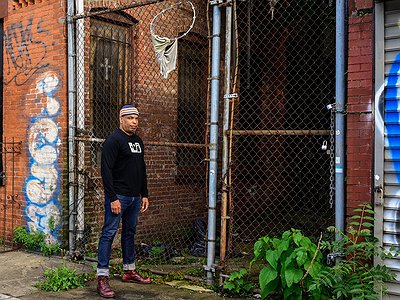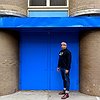Part 1
Name: Joaquin Joe Claussell
Nationality: American
Occupation: Producer, DJ
Current release: Joaquin Joe Claussell's Raw Tones LP is out now on Rekids.
Recommended Reading: I do a lot of reading and this is difficult because there are so many. But if I have to pick one: The Mysticism of Sound and Music – The Sufi Teachings of Hazrat Inayat Khan.
If you are ever in doubt and therefore in need some reassurance on the important role that music plays in our lives, but are also looking for inner peace and solace - then this book is for you …
Recommended Music: Michael Kiwanuka – Kiwanuka LP; Theo Parish (feat Maurrisa Rose) – This is for You on (Sound Signature); Joaquin Joe Claussell Presents Raw Tones. On (Rekids Records); Herve Samb & Daniel Moreno Kharit on (Sacred Rhythm Music); Ahmal Jamal – Crystal LP on (Atlantic Jazz); Rebel Tumbao – On (Sacred Rhythm Music)
If you enjoyed reading this interview with Joaquin Joe Claussell, head over to his Instagram and Facebook accounts for more up to date information. You can also buy music directly from Joe Claussell via the stores of Sacred Rhythm Music and Atypical Dopeness.
We also have another feature with Joaquin, in which he explains his creative process in more detail.
When did you start DJing - and what or who were your early passions and influences? What is about music and/or sound that drew you to it?
It all began at a really young age soon after I became aware of what it was that penetrated my soul so deeply and pleasurable and in such a way that nothing before could make me feel.
But I must say that I have mostly my mother and older brothers to thank for it. You see, I grew up in a home where it was literally all about music being played 24/7. There was always a turntable or some sort of listening device available to listen and space groove. Truth be told, I can never do justice explaining what the music environment I grew up at home was like. And for the record, I hold no claim to knowing fully the historical significance of the DJ culture and the music that was being played back in the seventies in the way that the likes of a Dj Bacho, Carlos Sanchez, FK or DK do. I must admit however that in many ways I feel that to be a blessing. One of my favourite DJs from back then was DJ Rene Hewitt. Who is he you might ask? Rene was the resident DJ at a well-known disco called the Infernos. He was incredible.
Aside from that I had a totally different upbringing musically. I came from the culture where the entitely of the album was being listened to. My debut as a working DJ began on July 21st, 1996. That date marks my first major DJ gig in New York with Body & Soul. The event took place at New York’s legendary, but sadly missed Club Vinyl. Things spiralled upward from there.
For most artists, originality is first preceded by a phase of learning and, often, emulating others. What was this like for you? How would you describe your own development as an artist and the transition towards your own voice? What is the relationship between copying, learning and your own creativity?
There were of course a few influences growing up as a teenager, However, I can’t say that I ever tried to emulate or even mimic any DJ. I believe that's because I was too busy feeling the music and dancing.
I consider myself to be more of a dancer at heart than a DJ till this very day.
What were some of the main challenges and goals when starting out as a DJ and how have they changed over time? What is it about DJing, compared to, say, producing your own music, that makes it interesting for you?
Aside from working hard at as a teenager: Desperately trying to learn how to blend two records together so to avoid the insults that would come from my childhood bedroom DJ friends. Once I got a grip on it, everything else came natural. But it does help that I came into it from the perspective of being a dancer, and so, figuring out how to make others dance came easily.
One thing that I pay attention to is to never underestimate nor take lightly the huge responsibility that rest on my shoulder when playing out, which is why I am always super focused on doing my job. Because in the end, there is no greater feeling than knowing that you were instrumental in people leaving the venue satisfied, inspired and healed.
How would you define the job and describe the influence of the DJ? How are the experience and the music transformed through your work?
I can only really speak on this based solely on how it relates to me.
I see the role of a DJ as being a conduit for something greater than all of us. The current landscape of DJ culture doesn’t practice this and that’s unfortunate. But if we were to look at music and art through the lens of spirituality and freedom that derives from it, then I believe that bestowed upon us would be the ability to recognize the incredible gift that we’ve been blessed with.
DJs as well as those who choose art as their output of expression are given a golden opportunity of transforming the world from the chaotic state that it currently is in to a peaceful planet filled with proper love and understanding. It’s all well and good to see some booty shaking and hands up towards the air on the dance floor. But what I really strive to witness are folks becoming radically changed to the point of wanting to step out into the world and strive to make a difference.
What was your first set-up as DJ like? How and for what reasons has your set-up evolved over the years and what are currently some of the most important pieces of gear for you?
I came from an era where friends would pool their gear together and jam in our bedrooms. I never really had my own DJ set up until I was 26 years of age, just around the time that I moved out from home. I will say though that I am still most comfortable with using gear from back in the day than what most prevalent nowadays. There’s something about playing music using a Reel to Reel Tape Machine for example that today’s technology still can’t match as far as I’m concerned. I love having to be forced in being fully engaged due to being at the mercy of having to put my skills through the test rather than the convenience of sync buttons and laptops etc. But that’s just me.
I’m not at all shitting on those who choose to go that route, really, I’m not. I mean; you have to start somewhere.
How do you make use of technology? In terms of the feedback mechanism between technology and creativity, what do humans excel at, what do machines excel at?
I feel that we’ve become overly dependent on machines doing all the thinking and work for us.
Could you take us through a day in your life, from a possible morning routine through to your work? Do you have a fixed schedule? How do life and creativity feed back into each other - do you separate them or instead try to make them blend seamlessly?
In short, my day usually begins with me looking out my window, facing upward towards the sky and giving thanks for being allowed to wake up to another day.
Soon after I drink a warm glass of water with lemon, then soon after that, I go for run and soon after workout in the gym. Around an hour later I help prepare my young son for his day and soon after drive him to school. I come home, check and reply to emails, then head to my Sacred Rhythm Music Office and at our Cosmic Arts Community Centre, put in a few hours of work, then head to the music studio to work on the plethora of projects that are in need of my attention.






